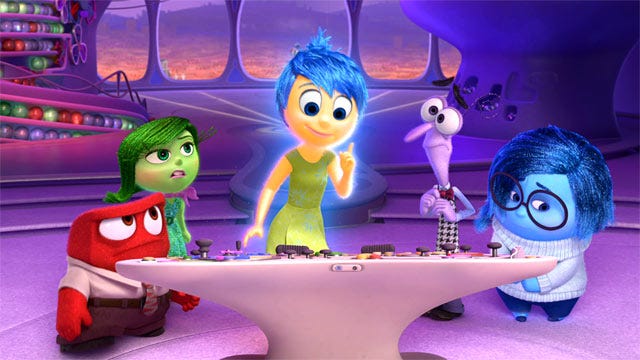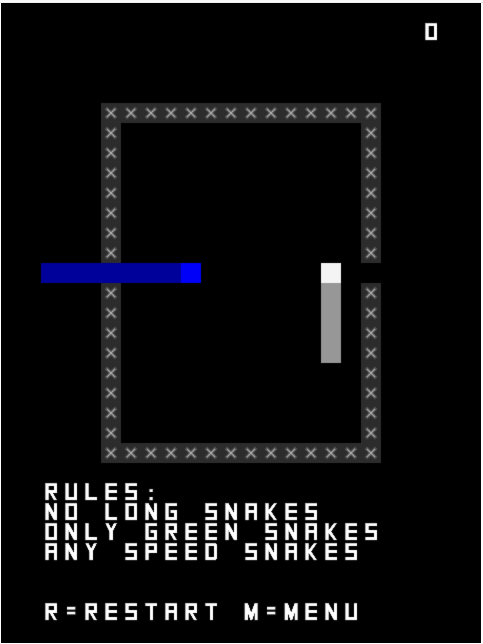Trending
Opinion: How will Project 2025 impact game developers?
The Heritage Foundation's manifesto for the possible next administration could do great harm to many, including large portions of the game development community.

Featured Blog | This community-written post highlights the best of what the game industry has to offer. Read more like it on the Game Developer Blogs or learn how to Submit Your Own Blog Post
I define life-like games as those games that are about life and defend the idea of them.

I recently received some very interesting feedback on The Quiet Sleep (available in Early Access on Steam) and that prompted this piece on games of this genre. This article is going to be much easier to understand if you play The Quiet Sleep, or at least watch the trailer below.
Firstly, I don't think there is a good name for games like The Quiet Sleep, and so I'm going to coin the term life-like for them. We've had DOOM-like for games like DOOM and roguelike for games like Rogue, so I'm calling this life-like because it is like life.
A fair part of the reaction to The Quiet Sleep comes not from the game itself, but from the idea of the game. It feels unnatural to a lot of people to have a game that attempts to model someone's mind and personality with systems. Using the mind as a setting or theme as Psychonauts and even Inside Out have done doesn't feel wrong in the same way The Quiet Sleep does to many people and this is probably because they get to feel less descriptive of thinking as a whole. They use the way we think as a setting and so get the feelings of novelty and of seeing something familiar through a new lens that The Quiet Sleep banks heavily on without needing to detail a full system like The Quiet Sleep did and so without the unpleasantness of its core statement.
The Quiet Sleep is a statement on the way that people behave and it feels wrong because it seems wrong to make a statement on human relationships and experiences with the limited expressiveness of a game system.
The best way to look at this difference is when, in Inside Out, crates of facts and opinions get mixed up and Joy cannot figure out which was which because they look identical. This was a throwaway joke (and quite a good one) there, but The Quiet Sleep would need a full system to communicate the same thing. Something like the Headquarters in Inside Out is something that elicits a laugh from the pun and can then be forgotten. Inside Out even seems to state that your actions all have their root in one of the five main emotions of the movie, which I personally believe to be absurd, but the movie never actually forces you to engage much with that idea.

Also, Inside Out isn't the only thing to have talked about how you think. The Quiet Sleep is (as far as I know) the only thing that presents a system for the mind in a manner anything like the way it does and has the standard issues of being the only game in the room, which are that it automatically feels weird and that any flaws of the specific game are easy to conflate with flaws of the genre as a whole.
There is a strong existing narrative that people are fundamentally not systems and so making a system to represent people is at best going to be heavily flawed. So, here I want to first talk about the idea that games like this should exist without going into the specific case of The Quiet Sleep.
The idea of thinking as people of systems has a lot of toxic baggage associated with it. The idea of strict cause-and-effect with people feels strongly tied to the manipulation and abuse of other people. It is thus natural, and very justified, for people to feel revulsion towards the idea of making systems-heavy games about how people think.

I do think however, that we can both make and consider these systems without losing a sense of empathy. A classic example of this would be in understanding the impact of your actions on the people around you. A statement like "When I do X, you feel Y" is the representation of part of your relationship as a fragment of a system but is, almost by definition, empathetic.
I also think that there is a large difference between viewing a number of people as interchangeable pieces representable with a single system and representing an individual with a system. I also think that focusing the game on the player character instead of on manipulable third parties does a lot to keep this game in the right space.
I do legitimately believe that The Quiet Sleep functions very well as a self-help book. I think that by presenting a system like this to represent the mind of the player character, it lets the players themselves represent their issues in a similar way, and so helps them frame their problems in a way that naturally gives them a substantial amount of autonomy. I think that this is an important step towards actually fixing these problems as it lets the player both identify issues they face and strategies for dealing with them. Something like taking time to recuperate after an emotional period is more clearly explained through The Quiet Sleep than through anything else that I've ever seen.
Also, can you think of a greater implementation of wish-fulfillment than being able to gain control over your life and develop your personality with nothing more than your own mind?
If there's value in the instance, then there must be value in the genre. However, the value of the game is not simply in its ability to improve the player as a person. These games are valuable because they advance the medium. They are new and the novel is important in its own right. Furthermore, this genre allows you to express things that you cannot with other media and other genres of video games. Any expansion of vocabulary is meaningful in itself.
Most of all however, this genre is valuable because it is valuable. It doesn't have to be true or help humanity or expand the vocabulary of games or anything at all. The value is intrinsic.
Another issue with life-like games is that we like to think that people are fundamentally unpredictable because we like to believe that we are fundamentally complex. Representing a mind with something as simple as a game like The Quiet Sleep is honestly a little insulting in a way that representations for combat are not.
Also, this game is a very tech, very rationalist approach to expressing the traditionally amorphous concepts of thought and emotion. It feels like clockwork instead of something more organic. The Quiet Sleep itself often reminds people of Opus Magnum.
I think that the key to making a game of this genre is the acceptance of their being imperfect translations. The Quiet Sleep is not meant to be a 1:1 facsimile of the working of the human mind, but to make a point and to tell a story. Specific parts, such as the currency conversions (like energy to travel) and the tower defense to handle emotions are heavily emphasized because those are the points that I wanted to make with the game, not because they are hard truths.
Additionally, there are just a lot of compromises that have to be made when making a game. I had to compromise heavily for the sake of playability and just because of the realities of being a single person making a game. Compromise is an integral part of the creation of art and people are mostly good at understanding this when consuming that art, but the novelty of this game does throw the issue into sharp relief.
A good place to start with this idea of translating a system imperfectly is in Sibilant Snakelikes. That game reimagines games like Papers, Please and Minesweeper through the lens of a Snakelike game. The result is naturally not an exact replica of the original. By filtering the game through the lens of Snake, the result is naturally something entirely new, but the Snakelikes maintain the base feeling of the games they draw from. The Shadow of the Colossus Snakelike evokes the feeling of fighting a behemoth with the pieces of Snake.

Given the constraint of only using snakelikes, it is impossible to fully remake the base game, but it is feasible to drill down to the core of the original and recreate that with different pieces. Similarly, I tried not to fully represent the way people think with The Quiet Sleep, but instead to model something of the core behind a specific part of how people think. It is no more a model of the way people think than the snakelike is of Papers, Please. It's quite a bit further from the original than The Treachery of Images is to the pipe drawn.
We let movies and books get away with broken translations all the time. There are a lot of cause and effect storylines with relationships. Person A didn’t believe Person B at Critical Moment C and so Person B left when Person A needed them the most makes for the cliche second act of innumerable movies. This is a system in miniature, and even a universal one, but one that we are used to seeing and so better at digesting. It's a broken system though. Real life doesn't have the person you ignore desert you at the most poignant moment possible, or at least not consistently.
Those media are much better at presenting a situation as an individual case however. We criticize them when the situation described seems implausible, but with games, it feels more correct to criticize when a plausible situation is ignored as the system described is then incomplete.
Despite this, it is my belief that a larger population of life-likes will automatically bring their level of acceptance closer to that of comparable genres in other media. A collection of games in this space will let people treat each one as more of an individual statement and less of a universal one. Also, it will give us a common vocabulary which will let us define a basic set of assumptions for the player, much in the same way that HP adds no cognitive burden to a game despite being deeply nonsensical.
A traditional and effective way to build a game like this is through the use of goofiness to cover the cracks in the systems of your life-like game. The Sims, for instance, does a lot of this and so avoids much of the weirdness that The Quiet Sleep faces. It even manages to represent meaningful systems while doing this, like how the people of the game get depressed if they do not socialize with anyone for a while and how some retail therapy can do wonders for your mood. However, this same goofiness makes it harder for the lessons of the game to stick. If The Sims thinks that the systems and their results are somewhat ridiculous, shouldn't you do the same?
I believe that we can also build life-like games by focusing on a smaller slice of life than a game like The Sims. By narrowing down to a smaller set of systems and then pruning them and abstracting extraneous information, we can make more confident statements about the systems of everyday life.
It may feel strange to play the first few ones, but I fully believe that we will quickly overcome that early discomfort and that this genre will find its place in the medium.
Read more about:
Featured BlogsYou May Also Like